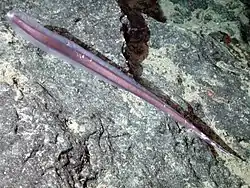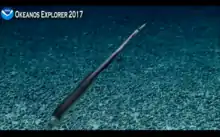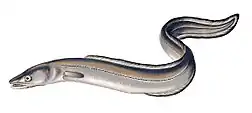Nettastomatidae
Nettastomatidae, the duckbill eels or witch eels are a family of eels. The name is from Greek netta meaning "duck" and stoma meaning "mouth".
| Nettastomatidae | |
|---|---|
 | |
| Venefica tentaculata | |
| Scientific classification | |
| Kingdom: | Animalia |
| Phylum: | Chordata |
| Class: | Actinopterygii |
| Order: | Anguilliformes |
| Suborder: | Congroidei |
| Family: | Nettastomatidae |
| Genera | |
|
Facciolella | |

Duckbill eel from 2017 NOAA Okeanos expedition at a depth of 2,600m (8530ft)
Duckbill eels are found along the continental slopes of tropical and temperate oceans worldwide. They are bottom-dwelling fish, feeding on invertebrates and smaller fish.[1] They are slender eels, up to 125 centimetres (4.10 ft) in length, with narrow heads and large, toothy, mouths. Most species lack pectoral fins.
Species
About 40 species are placed in seven genera:
- Genus Facciolella
- Genus Hoplunnis
- Genus "Leptocephalus"
- Genus Nettastoma
- Genus Nettenchelys
- Genus Saurenchelys
- Genus Venefica
References
- McCosker, John F. (1998). Paxton, J.R.; Eschmeyer, W.N. (eds.). Encyclopedia of Fishes. San Diego: Academic Press. p. 90. ISBN 0-12-547665-5.
- Froese, Rainer, and Daniel Pauly, eds. (2011). "Nettastomatidae" in FishBase. June 2011 version.
This article is issued from Wikipedia. The text is licensed under Creative Commons - Attribution - Sharealike. Additional terms may apply for the media files.
